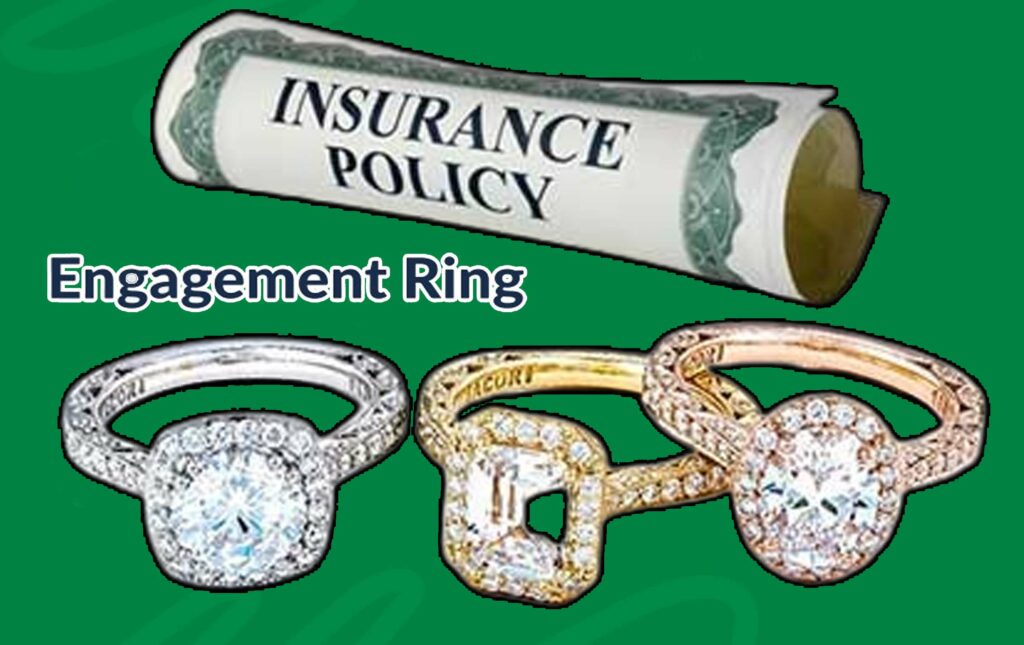It doesn’t necessarily need to be a special occasion before you get down on your knees to give her an engagement ring. While in this position, having engagement ring insurance is vital in case the ring gets damaged, stolen, or lost. It can be very painful to lose an expensive engagement ring, but with coverage, you can easily get around it.

This insurance is designed to cover the cost of repairing or replacing an engagement ring if it gets damaged or stolen. When the ring gets stolen, this insurance replaces the ring with the same ring from the same brand. This insurance has different additional coverage options you can select from, and it offers coverage based on what coverage and additional coverage you purchase.
Furthermore, engagement rings can be purchased as additional coverage to your homeowners or renters insurance. While it is called engagement ring insurance, on your homeowners or renters insurance, engagement rings will be covered under a jewelry insurance policy, or they will be purchased as a floater. However, this insurance, can either be purchased as additional coverage or as a standalone policy.
What Engagement Ring Insurance Covers?
As previously stated, engagement ring insurance covers the cost of repairs or replacement of an engagement ring. This insurance covers the following events:
- Theft.
- Mysterious disappearance.
- Damage.
- Loss.
It is important to check your policy limits and what is covered to be knowledgeable of when your engagement ring coverage will offer coverage and when it will not. However, irrespective of what type of engagement ring coverage policy you get, it will offer coverage in any part of the world.
What Are the Exclusions
While there are some events this insurance covers, there are also events it doesn’t cover. These events include:
- Intentional damage or loss.
- Nuclear hazard.
- Pre-existing damage to the ring.
- Military action or war.
- Deterioration.
- Manufacturer defect.
- Pest damage.
- Selling off the ring.
- Wear and tear.
In cases like this, your engagement ring insurance will not offer coverage. Also, if you lose or damage your engagement ring due to negligence, this insurance will not cover it.
Engagement Ring Insurance Cost
This insurance typically costs between 1% and 2% of the engagement ring’s value. For a ring worth $6,000, that translates to an annual cost of $60 to $120, or roughly $5 to $10 per month. However, the actual cost can vary based on several factors and the specific type of insurance coverage you choose. You need to check with your insurer to know how much your insurance will cost.
Who Needs Engagement Ring Insurance?
While it is advisable to insure your engagement ring, there are a few people who should insure their engagement ring. You should insure your engagement ring if:
- You go on trips more often, and you suspect it raises the risk of losing the ring.
- You misplace things easily.
- Affording the replacement or repairs of the ring seems almost financially impossible.
- If your finances will be affected if the ring is lost or damaged.
- You will have peace of mind knowing your ring is insured.
If you fall under any of the above situations, you need to purchase engagement ring insurance.
Does My Homeowners Insurance Cover Engagement Rings?
Your homeowners insurance policy offers jewelry insurance coverage. Under this coverage, engagement rings are covered. This homeowners insurance policy covers repairs and replacements of jewelry, which include engagement rings. However, this policy has a limited coverage limit, but to get more coverage, you can pay more. Although this coverage may reduce the value of your engagement ring, it is still another way to insure it.
Is it Worth It?
Yes, engagement ring insurance is worth purchasing. This is because it offers peace of mind that your finances will not be affected in case of any unexpected event. You can buy this insurance either as a separate policy or include it within your homeowners or renters insurance coverage.
Who Pays for Engagement Ring Insurance?
Generally, the owner of the ring should be the one to insure the engagement ring. This means that the person who purchased the ring should insure it. However, this is advisable because it makes more sense to insure the ring instead of waiting until you are asked to.



